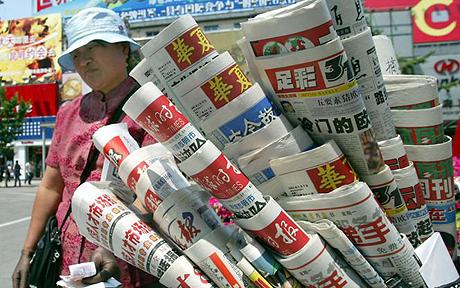At Radio Free Asia, Qiao Long reports on the recent detentions of investigative journalists Zhang Yongsheng, Luo Huansu, and Zhang Zhenguo. The three reporters were stationed in Wuwei, Gansu, and known for filing reports critical of the city that had strained relations with municipal propaganda officials and police:
Zhang Yongsheng, a reporter for the state-run Lanzhou Morning Herald, was detained on Jan. 7 by police in Gansu’s Wuwei city and later accused on an official government website of “using his position as a journalist, in the name of public opinion supervision, to repeatedly extort goods and money from others.”
According to the New York-based Committee to Protect Journalists (CPJ), police initially said he had been arrested for prostitution but later changed the charge to extortion.
On Jan. 8, Wuwei police also detained Luo Huansu, a reporter with the Lanzhou Evening Herald, and Zhang Zhenguo, journalist with the Western Business Herald, the CPJ said in a statement on its website.
They were accused of being Zhang Yongsheng’s “accomplices,” it said.
Luo was charged with extortion, while Zhang Zhenguo is still under investigation, although both men have been released on bail. […] [Source]
The South China Morning Post’s Jun Mai reports further on the investigative reports that led to tension with city officials, and may have prompted the arrest of Zhang Yongsheng and detentions of his colleagues:
The source attributed the tensions to a series of investigative articles. An article by Zhang Yongsheng in 2014 revealed that around a dozen pupils and students in the city had been coerced by gangs into selling blood.
The article had prompted follow up coverage by various news organisations, including CCTV. Another article by him in 2011 revealed a Wuwei police officer had helped a fugitive and suspected murderer change his legal name.
Shortly before the arrests, Zhang Yongsheng told colleagues he had received threats from local police and been warned against publishing some stories, which he filed anyway, said the source.
On January 7, a fire drill in Wuwei had spiralled out of control, according to local news outlets.
Zhang Yongsheng had been told by a local propaganda official not to cover the fire, before he became unreachable, said the letter by the Lanzhou Morning Post.
About a week into Zhang’s detention, Wuwei police officers visited his paper’s office, asking about his articles, including the blood selling and fugitive stories. [Source]
In a call for the immediate release of Zhang Yongsheng last week, the Committee to Protect Journalists reported that authorities barred Zhang’s wife from visiting him in detention, and noted that official claims about widespread corruption among Chinese journalists are difficult to verify within the opacity of China’s media landscape:
The police allowed Zhang’s wife to visit him in prison, which is in violation of Chinese law, according to the open letter attributed to the Lanzhou Morning Herald [which the paper has since denied writing]. During the meeting, Zhang asked his wife to replace the current lawyers with a new one. Zhang’s wife was quoted as saying she believes Zhang said this under pressure.
Corrupt practices among journalists are pervasive in China, according to experts on Chinese media. Dozens of journalists, from both the commercial media and state media, have been charged with bribery or extortion-related crimes in the past couple of years. Given the lack of transparent due process and the scarcity of independent investigative reporting in China, it is difficult to determine whether there is any validity to the authorities’ claims. [Source]
In 2015, CPJ found China to be the world’s largest jailer of journalists with 49 imprisoned—up from 44 the year prior and a record for the country.
In recent years, the Xi Jinping administration has tightened control over the media, encouraging reporters to adopt a “Marxist view of journalism,” creating a media ethics code promising to “protect the leadership of the CCP and the interests of the State,” firing and expelling from Party membership state media editors who question government policy, expelling critical foreign journalists from the country, and taking efforts to rein in the relative press freedom of Hong Kong. A new report from the International Federation of Journalists looks closely at this trend. From IFJ’s press release:
“Propaganda, censorship, surveillance, intimidation, detention, brutality and attacks and televised ‘confessions’ have become go-to tools for the government as they tighten their grip on the media and the press in 2015,” the IFJ said.
China’s Great Media Wall: The Fight for Freedom documents the broader issues impacting the work of local journalists and media workers across Mainland China, Hong Kong and Macau, as well as foreign journalists and online media. For the first time, the report also includes an IFJ assessment on the number of jailed and detained journalist and media workers and documents 51 cases, some dating back to 2009.
Now in its eighth year of operation, the IFJ’s China Press Freedom project works to support and defend media independence in the region while also documenting the ever-increasing layers of control enforced on the media. The 2015 China Press Freedom report documents the increasing efforts by the Chinese government and other authorities to stifle the media with tactics including laws, administrative rules, restrictive orders and censorship. [Source]








